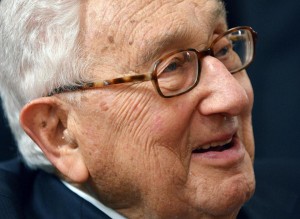The View from Henry Kissinger: Cambodia during the Vietnam War
Last Thursday, the former Secretary of State Henry Kissinger visited Harvard Law School to impart his insight and lessons concerning diplomacy, negotiation, and statecraft under the purview of the American Secretaries of States Project of Harvard University. The central focus of his sessions was placed on China and on the Middle East and his formulation and exercise of the foreign policy of the United States during his term as Advisor for National Security Affairs from January 1969 and concurrently as Secretary of State from September 1973 to January 1977 under President Richard Nixon administration and then President Gerald Ford administration.
As the discussion went deeper into the United States foreign policy for Asia in the 1960s and 1970s – when the Cold War era was in full motion, the role of the United States in the Vietnam War and its military operation in Cambodia emerged naturally as an animating theme. The war was not only fought inside Vietnam but also gradually expanded into Cambodia. Ultimately, it created catastrophic effect on Cambodia in terms of civilian casualties followed by over two decades of violent political turmoil.
As a national of Cambodia, during the discussion I could not resist but to pose to Kissinger the question about America’s foreign policy pertaining to the war. From his perspective, how could small countries like Cambodia, as a country that shares the border with Vietnam, have avoided being drawn into the war? To the extent that he was one of the key decision makers of the United States pertaining to the war, his account could provide not only a window into better options that might have been available Cambodia at the time but also some valuable lessons for other nations in the future.
Kissinger offered the following responses. At the height of the Vietnam War, it was North Vietnam that took the action to use Cambodian territory along the border with Vietnam as a strategic corridor to attack South Vietnamese and American soldiers. Many American soldiers were killed as a result. The United States had to counter the move by passing into Cambodian territory, generally within 10 miles from the border. The expansion was considered necessary to stop the killing of American soldiers in the field. When the United States executed the measure, it essentially reduced the killing of American soldiers by 90%.
Kissinger seemed to imply that not many Cambodians were hurt by America’s alleged counterattack against North Vietnamese. In his response, the American air raids only targeted the North Vietnamese soldiers and were mostly carried out in unpopulated areas along the Cambodian border.
Kissinger further noted that Prince Sihanouk in his public statement condemned any killing of Cambodian people caused by the spread of the military operations on the Cambodian soil. Kissinger also gave particular emphasis in the Prince’s statement that the Prince did not have certain knowledge about what who were hurt or what precisely happened along the border because of the remoteness of the areas affected by the war.
Toward the end of his reply, Kissinger recalled the overthrow of Prince Sihanouk and his government in 1970. He then stressed that the United States Government did not expect nor desire the collapse of the Prince’s political regime at that time.
Here, I would put aside the accuracy of his answer vis-à-vist he history of Cambodia during the Vietnam War. Verification of Kissinger’s account would be better served by those with a thorough understanding about Cambodia’s history and political development around the Vietnam War. Rather, I would plant my impression of Kissinger’s reply in relation to the original question.
Regrettably, I did not find the response from Kissinger satisfying. His answer did not shed light on what alternatives Cambodia could have at the time of the Vietnam War. Instead, what was given was the justification for his assessment of how the war developed and what prompted his authorization to execute the air raids on the Cambodian soil. In that regard, his evasiveness roused my curiosity even further. Would Cambodia have had sufficient space to maneuver from the sparks of the war and its devastating consequences had Kissinger not been the key decision maker of the United State at that time? Or would the institutional structure of United States foreign policy have culminated in similar disastrous outcome for Cambodia given the circumstances regardless of who were in charge of foreign policy and national security of the United States? Because it is impossible for a small nations to relocate geographically from war zone, then what would be the alternatives to being subsumed into the broader geopolitical conflicts devised by larger nations? Unfortunately, these questions remain unresolved. For a small nation like Cambodia, it is important that we keep exploring for the answer.


Keith
December 11, 2014 @ 6:20 am
Very good writing Lor, I’m very impressed with your level of writing and knowledge you put in this article. The bombing campaign, which drew Cambodia into Vietnam War was known as “Operation Breakfast”. It was a secret. Congress did not declare war with Cambodia and had no knowledge of the bombing. The bombing was to put pressure on Sihanouk to restore diplomatic relations with the U.S, but by the time Sihanouk realized the spread of the communism in Southeast Asia, it was too late. Lon Nol was already in the head of state and Americans committed to help his government fighting the communism.